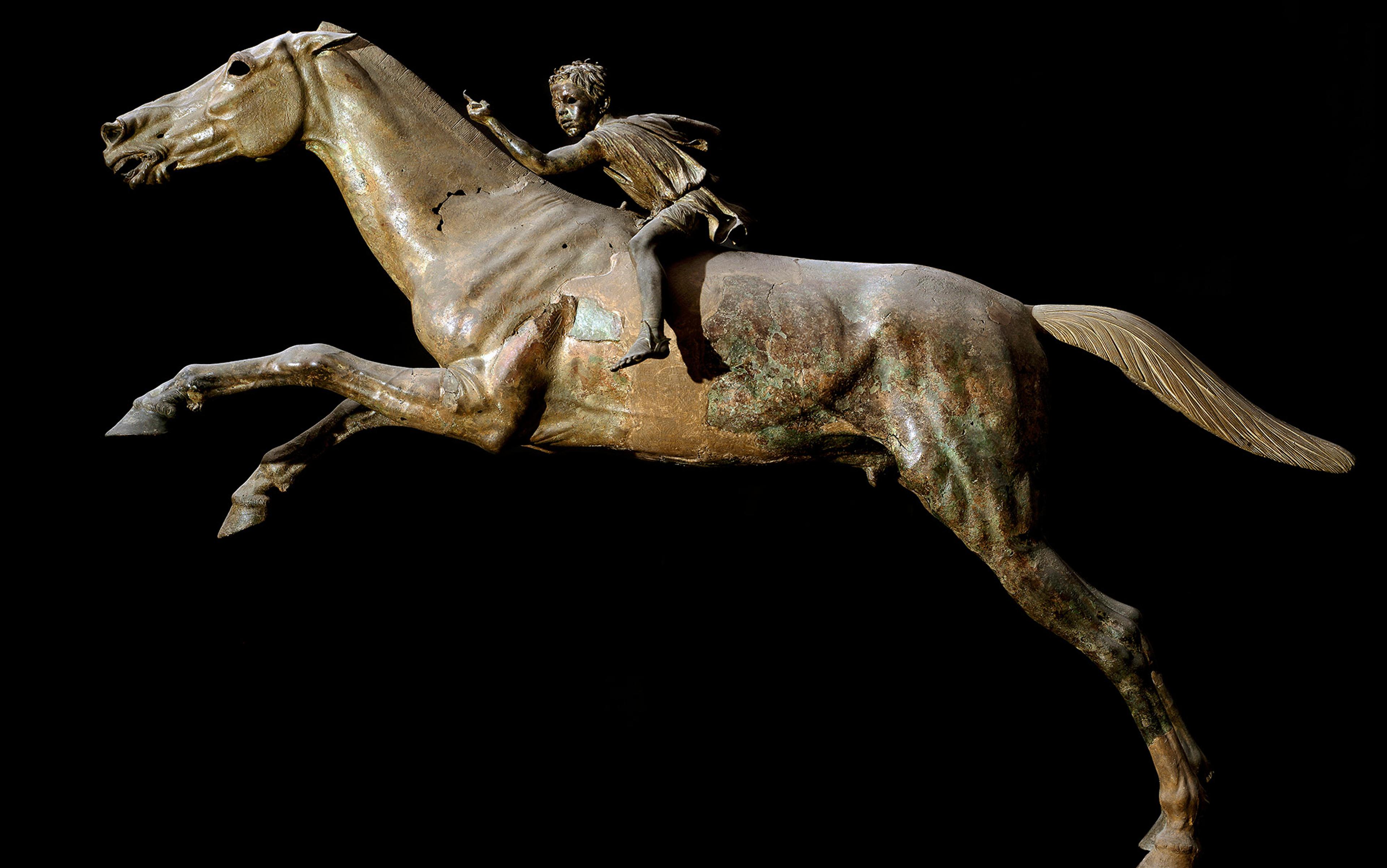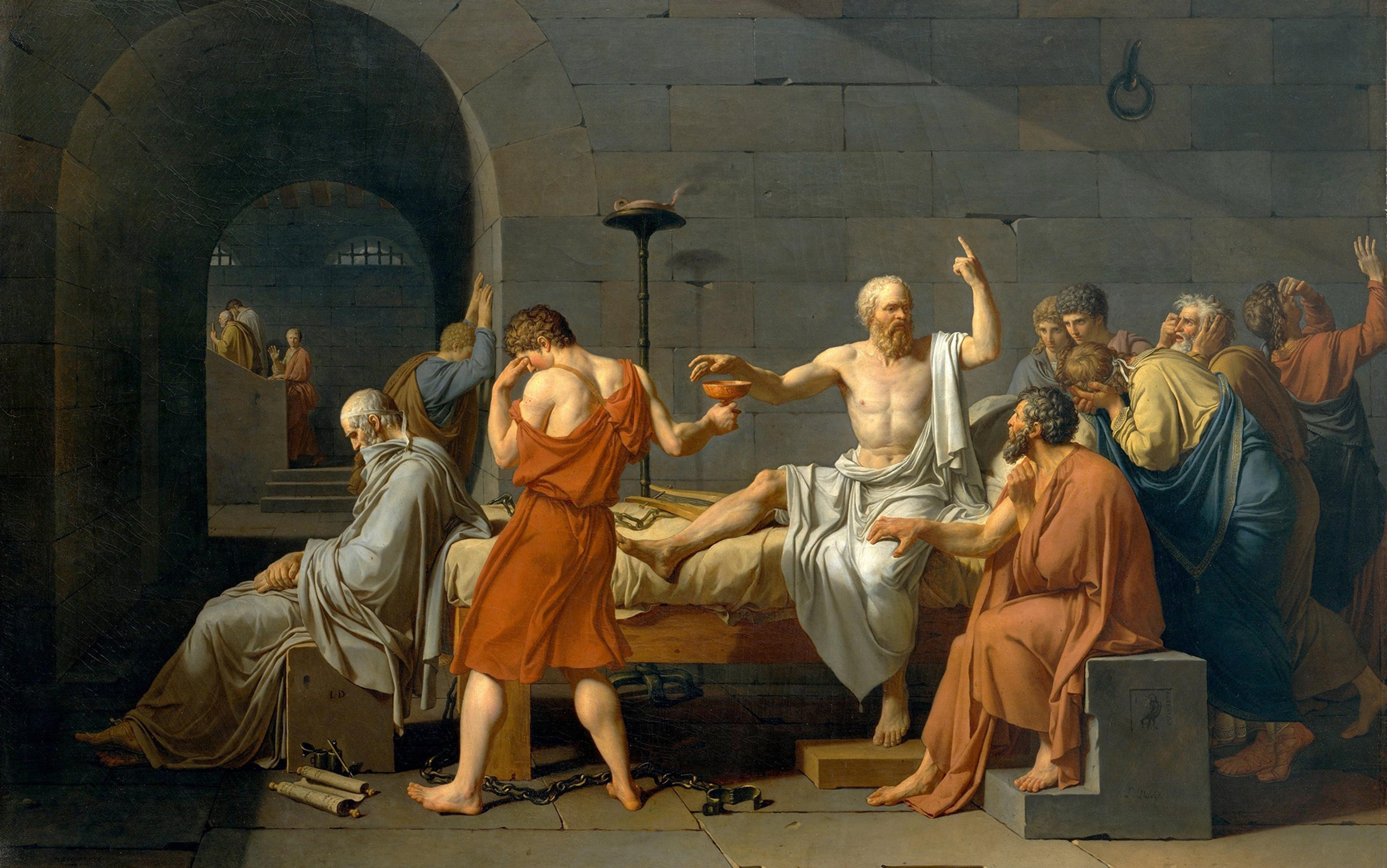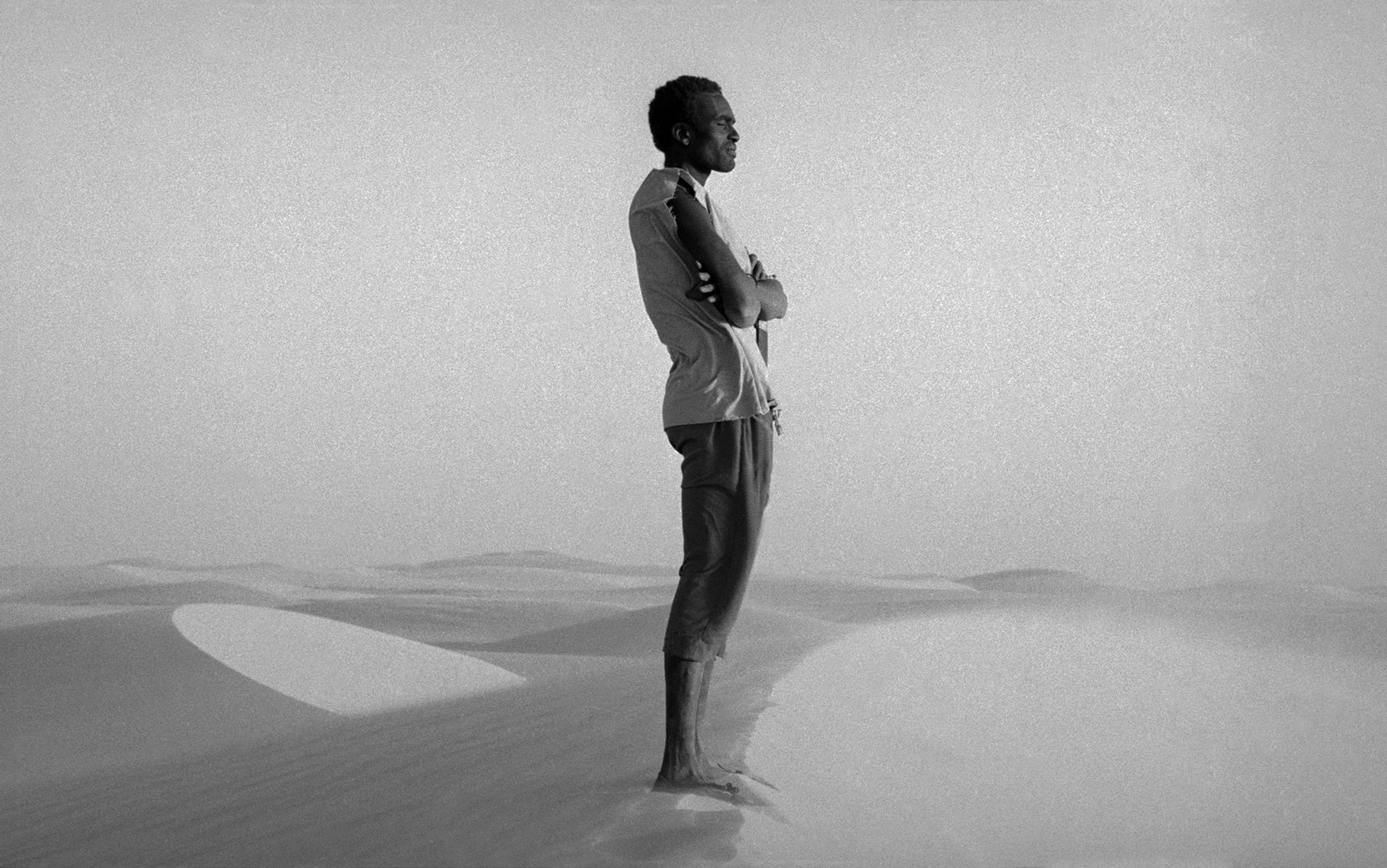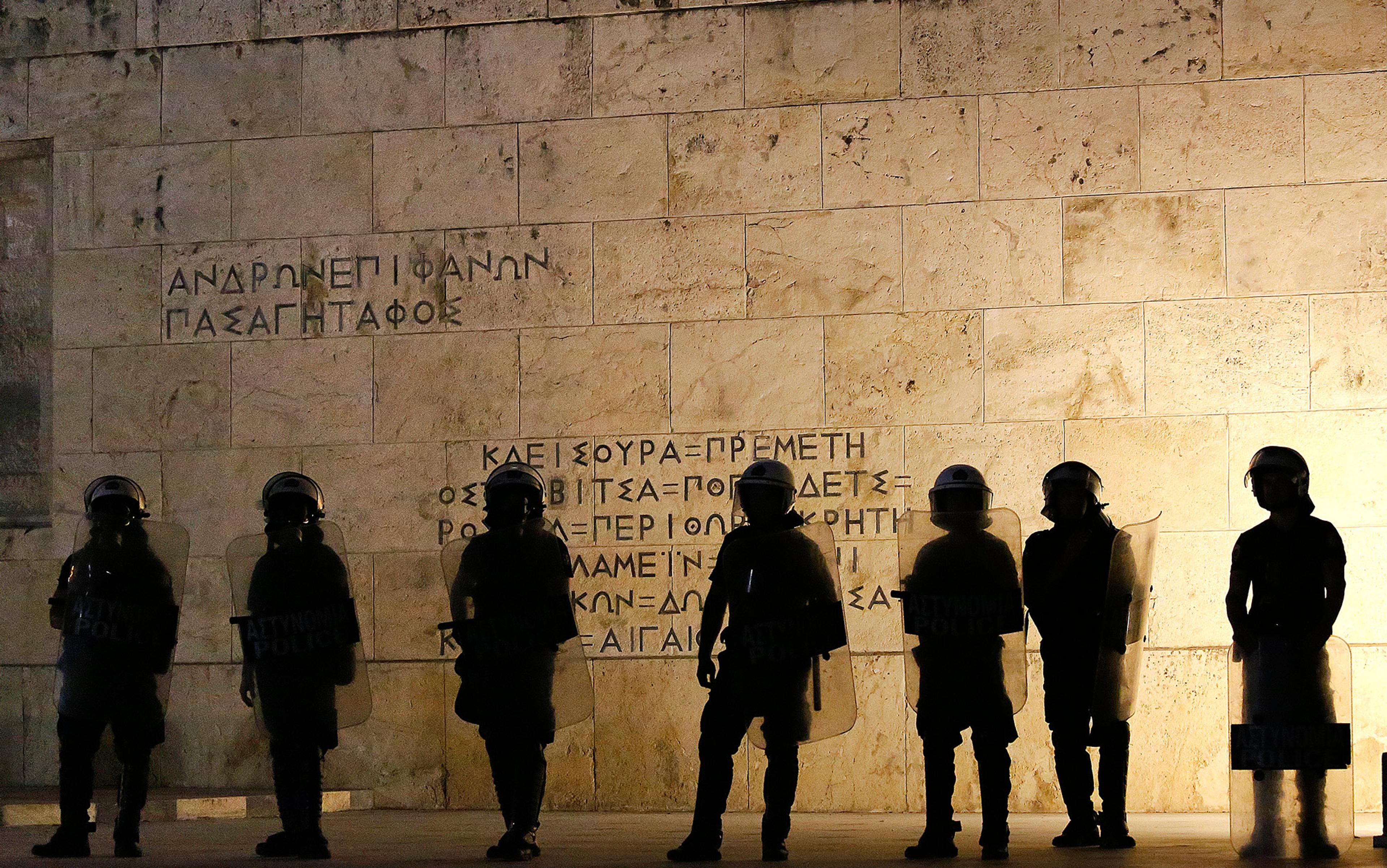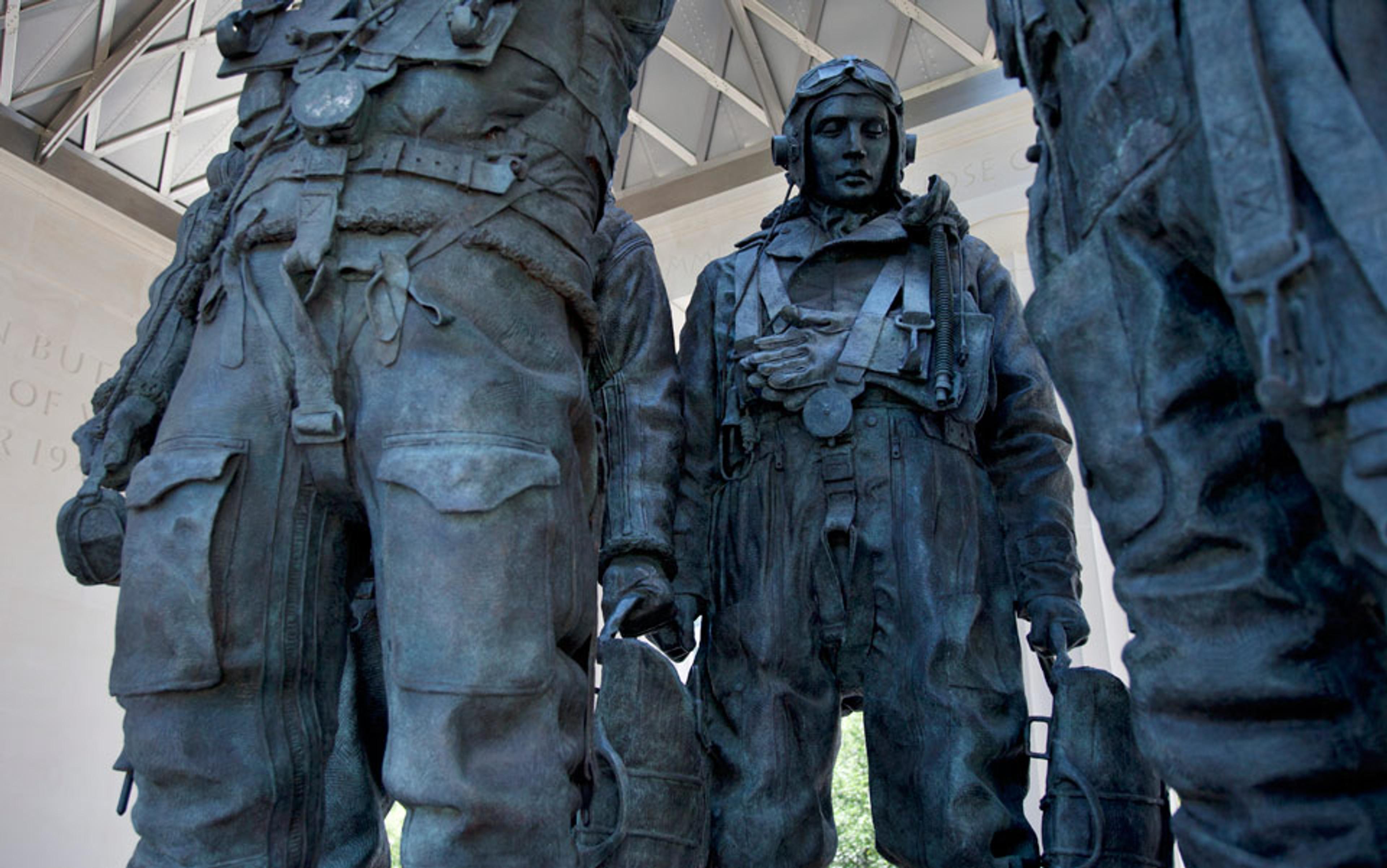The band of mercenary soldiers had been on the move through hostile territory for several months when they were told they had enlisted under a lie. They weren’t marching to put down a rebellion; they were instead marching in rebellion. Offers of special duty pay from their leader, Cyrus the Younger, however, calmed their anger and doubt, and on they advanced, dusty boots through the desert, as the heat of late-summer Persia rose around them in shimmering waves. The villages they passed by were hostile and strange: alien languages, customs, religions. There was little fresh water.
They has assembled under Cyrus in order to overthrow his brother and rival, Artaxerxes II, king of Persia. Before they reached his defensive line, they were harried on their flanks and from behind, depleting morale and using up their supplies. At a small village named Canaxa 50 miles north of Baghdad, they finally met the Persian king’s forces, on a day when the noon temperature could have fried a pork chop. As the battle began, Cyrus rashly charged Artaxerxes himself. He was pierced through by a javelin thrown by one of Artaxerxes’ guards, and died on the spot.
With heavy casualties and no reason to continue fighting, the mercenaries fell back. They were bleeding deserters. Those who had been recruited near Sardis and Smyrna, and who spoke some of the local languages, melted away. The remainders built camp and waited, parlayed, moved camp, skirmished, and waited some more. In the pitiless heat, now without communication or direction, they discussed their next moves with no particular conviction. After nearly a month of this, an envoy came: would their unit leaders please come to Artaxerxes’ tent and converse about their plans? The leaders agreed. The encamped troops waited for word on the parley. It was not until they saw Artaxerxes’ riders carrying the heads of their former leaders that the truth dawned on them. The campaign was lost. In order to survive, they must disperse.
So began this band of about 10,000 mercenaries’ two-year journey out of hostile country, from the heart of Persia to the shores of the Black Sea. Among the most important of the new leaders was a youngish Greek named Xenophon. By journey’s end, when he finally returned to Athens, Xenophon would have served the equivalent of six consecutive modern deployments and, like any modern soldier sent repeatedly into combat zones, he would be marked for life by what he experienced on that doomed expedition and the subsequent long march through winter mountains to the sea.
The Anabasis is the first military memoir in the history of Western literature, and it recounts Xenophon’s experiences in the Persian campaign of Cyrus against his brother King Artaxerxes, and the long march ‘up country’. Since Xenophon waited several decades to commit these memories to writing, some have argued that they cannot be accurate. But as anyone who has listened to combat veterans will know, there’s a lot about the remembrance of past tours of duty that time cannot soften nor the years wear away.
Xenophon also wrote histories, portraits of leaders, practical treatises on horse training, hunting and running a household, among other things. An enduring theme that runs through much of his writing, and which has received scholarly attention in recent years, is that of leadership. What makes a good leader? What kind of leader can induce humans to endure hardships and expend effort toward a common goal? What exemplary traits mark out a leader and allow him or her to execute the requisite tasks with skill, induce a harmonious fellowship among those for whom he is responsible, maintain loyalty and mission clarity among the ‘troops’, whomever they might be? It is not difficult to see the formative roots of these questions, and of Xenophon’s answers to them, in that literally death-defying, embattled 2,000-mile march up-country to the sea.
Xenophon also wrote down his remembrances of a local philosopher named Socrates. Those who know Socrates mainly through the writings of Plato – Xenophon’s near-exact contemporary – will find Xenophon’s Socrates something of a surprise. Plato’s Socrates claims to know nothing, and flamboyantly refutes the knowledge claims of others. In the pages of Xenophon’s Memorabilia, however, Socrates actually answers philosophical questions, dispenses practical life advice, provides arguments proving the existence of benevolent gods, converses as if peer-to-peer with a courtesan, and even proposes a domestic economy scheme whereby indigent female relatives can become productive through the establishment of a textile business at home.
Socrates happily confesses to solo-dancing: it’s great exercise and freshens the appetite
Socrates’ conversation, according to Xenophon, ‘was ever of human things’. This engaged, intensely practical, human Socrates can be refreshing to encounter. Anyone who has felt discomfort at how the opponents of Plato’s Socrates suffer relentless public refutations and reductions to absurdity can take some comfort in Xenophon’s Socrates who ‘tries to cure the perplexities of his friends’.
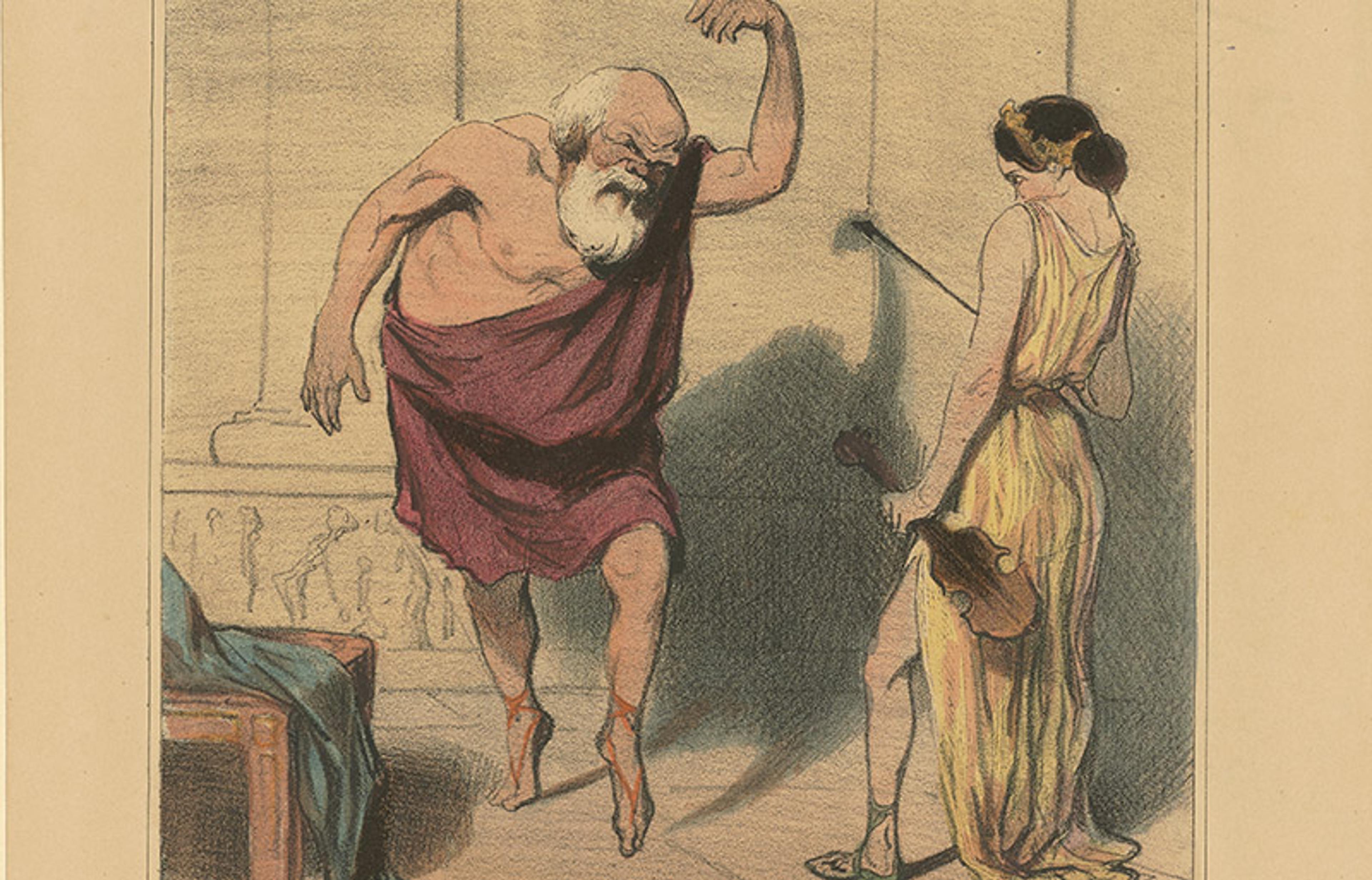
Socratic dancing as imagined by Honore Daumier. Courtesy Musée Carnavalet, Paris
For instance, what could be more enchanting than a Socrates who solo-dances for joy and exercise, so unlike the Socrates we know from Plato? In Xenophon’s Symposium, Socrates asks the Phoenician dance-master to show him some dance moves. Everyone laughs: what will you do with dance moves, Socrates? He replies: ‘I’ll dance, by God!’ A friend of Socrates then tells the group that he had stopped by his house early in the morning, and found him dancing alone. When questioned about it, Socrates happily confesses to solo-dancing often. It’s great exercise, it moves the body in symmetry, it can be done indoors or outdoors with no equipment, and it freshens the appetite.
Another surprising side of Xenophon’s Socrates is shown through his encounter with a person who not only doesn’t honour the gods, but makes fun of people who do. To this irreligious person, Socrates presents a careful and persuasive line of reasoning about the designed usefulness of all elements of creation. For humans and many other animals, there are ‘eyes so that they can see what can be seen, and ears so that they can hear what can be heard’, eyelids, eyelashes, molars and incisors, erotic desire to aid procreation; all these are ‘the contrivance of some wise craftsman who loves animals’. And what about the cosmos as a whole? ‘Are you, then, of the opinion that … those surpassingly large and infinitely numerous things are in such an orderly condition through some senselessness?’ Human beings even have the spiritual capacity to perceive the existence of gods, ‘who put in order the greatest and noblest things’, and ‘they worry about you!’
It is noticeable that this Socrates takes his conversation partner through logical steps that are not designed to refute him or humiliate him, but to awaken him to a different way of looking at the natural world. He already acknowledges that there are ordered systems of utility and benefit in nature; he just needs to think about how these could have come to be, and why, and to what end. It’s not brow-beating, but gentle leading, which leaves his intellectual self-respect intact. This is a hallmark of Xenophon’s Socrates. Through such conversations as these, Socrates showed his commitment to leading his companions toward virtue, making them better human beings – the highest aim of any leader, in any field.
Though the historical person of Socrates will remain forever enigmatic, it could be argued that Xenophon strikes closer to real life in his depictions of the man. Plato had a serious philosophical agenda of his own, involving a search for transcendence, purified rationality and sublimity. Xenophon’s interests are at once more worldly and more realistic.
The concept of ordered usefulness is central to the thinking of Xenophon’s Socrates. As with the individual aspects of the natural world, so also with the system of the world as a whole: it is an orderly, and therefore beautiful, cosmos. For Xenophon, the two – beauty and order – are definitionally connected, which comes through in the story of Ischomachus, the fictional narrator of Oeconomikos, Xenophon’s book on domestic economy.
Ischomachus recalls hearing someone describe a Phoenician merchant ship. Though the storage area was not overly large, all the equipment was easily accessible and nothing interfered with anything else. This was, he says, ‘the most beautiful and meticulous arrangement of equipment that I ever saw’. The ship’s mate has this beautiful orderly spectacle so deeply engraved in his mind that he can describe every article’s position when away from the ship. Ischomachus, who is engaged in telling his wife how they can best cooperate on home storage, stresses the similar value of neatly ordered household items:
And what a facetious man would laugh at most of all, but a serious man would not: even pots appear graceful when they are arranged in a discriminating manner … All other things somehow appear more beautiful when they are in a regular arrangement. Each of them looks like a chorus of equipment, and the interval between them looks beautiful when every item is kept clear of it, just as a chorus of dancers moving in a circle is not only a beautiful sight in itself, but the interval between them seems pure and beautiful too …
Beautiful pots in rows! And beautiful shoes and sheets: ‘How beautiful it looks, when shoes are arranged in rows, each kind in its own proper place, how beautiful to see all kinds of clothing properly sorted out, how beautiful bed-linens, bronze pots, tableware!’ The rationale for the beauty of order is functional. In disordered systems, things get in the way of each other. Looking for the shoes that bring us joy, we must flail through the odd ones that pinch our toes. Order creates ease and efficiency. To illustrate, Xenophon reverts to his early military experience:
An orderly army is a most beautiful sight for its allies to see, and most odious for its enemies … When they march in order, even if there are tens of thousands of them, they all proceed smoothly as one man … In the absence of order, an army is rendered ineffectual … An army in disorder is a most chaotic thing, both very easily overcome by its enemies and a most disgraceful sight for its allies, and most useless too, with mule, hoplite, baggage-carrier, light-armed troops, cavalry and wagons all mixed together. How could they march in such a state? They will impede each other …
Oeconomikos also shows that Xenophon’s depictions of women are unusually thoughtful and respectful. The young wife who is being lectured about household storage by Ischomachus is described as a business partner in the enterprise of running a good domestic start-up. She asks tough questions of her mansplaining husband, jokes about their sex life being ‘as rumour has it’, and has a habit of mild cursing.
Nowhere else in the literature of the time do we find a philosopher conversing about ethics with a courtesan
Or take Theodote, the distinguished courtesan whom Xenophon’s Socrates visits, whose beauty is described as overwhelming. Artists visit to sketch her, discussing her allure in the third person while sitting in her own house. Socrates breaks into this objectifying circle and addresses her directly. The two have a bantering conversation about how to make and keep friends, and what it means to be a true friend. Alternately flirtatious and lightly serious, the exchange is as remarkable as it is unique – nowhere else in ancient Greek literature do we find a well-known philosopher conversing about ethical matters with a businesswoman in a socially dangerous profession. Theodote offers to ‘spin his magic wheel’ for him; this was a love-spell device consisting of a wooden disk between two sets of spinning strings. Socrates declines, but ends by inviting Theodote to come and visit him at any time, for further conversation. The incredulous reader is left feeling like someone who has witnessed a strange power meeting between two executive players on an even field – which Xenophon felt necessary to preserve.
Xenophon’s portrait of Pantheia, the Persian queen and prisoner of war – which stretches across three books of Cyropaedia, his massive biography of Cyrus – stresses her resolute virtue and moral strength in this difficult, dangerous position: a beautiful female captive in the camp of a standing army. Pantheia manages to negotiate her way through the dicey situation of having her main guard fall passionately in lust for her, keeps herself safe, gets a message to Cyrus, and gets moved to safety, maintaining her fidelity and equanimity. Her husband joins Cyrus’ army in gratitude, and manages to get himself killed due to a vainglorious self-designed chariot with eight side-by-side horses and whirling scimitars on its wheels. Pantheia recomposes his sliced-up body and commits a perfectly melodramatic suicide over his corpse.
This mini-narrative becomes a self-standing romantic novella that retained its popularity into the high Middle Ages, and was still being excerpted and dramatised into the 19th century. What is most striking about Xenophon’s treatment of the Pantheia scenes is her robust moral agency, even in the apparently helpless position of a prisoner of war. Through sheer force of will, Pantheia keeps herself safe and preserves honour in her perilous position.
Among Xenophon’s most famous practical treatises is On Horsemanship, which guides the reader in how to train a war horse. This treatise has been hugely important and influential among actual horse-trainers and equestrians, for its humane and empathetic training advice, and its evident joy in the sheer beauty of the horse-human relationship. Xenophon’s name and ideas show up frequently in contemporary articles in horse journals, particularly ones oriented toward dressage or ‘classical training’, but also on natural horsemanship and Western riding disciplines. International horse-training centres are named after Xenophon, as are therapeutic riding centres and Facebook horse groups.
For Xenophon, horses and humans have many things in common, and this point (which is applicable to Xenophon’s continuing interest in leadership) is stressed throughout. Neither humans nor horses learn or perform best under conditions of duress, fear or violence. Both display their strengths when their natural willingness and joy in movement is engaged:
For what a horse does under constraint, he does without understanding, and with no more grace than a dancer would show if he was whipped and goaded. Under such treatment horse and man alike will do much more that is ugly than graceful. No, a horse must make the most graceful and brilliant appearance in all respects of his own will with the help of aids.
A horse is not to be forced to do something but should be allowed to understand what is being asked. Both horses and humans show their best work when they are engaged willingly and knowingly.
Xenophon’s number-one rule of horse-training is to check your anger at the barn door. ‘Never approach a horse in anger, for anger is thoughtless’ – and having your wits about you while working with a 1,000-pound animal is a requirement. Horses have their own equivalent of anger, which is spirit (thumos). Angrily interacting with a high-spirited horse can lead to ‘many irreparable injuries’ both to the horse and to the handler.
A well-schooled horse will take pleasure in his job. The horse can be ‘anxious to display his beauty’; he will ‘bear himself proudly when ridden’ after proper training; ‘he bounds forward for very joy with a proud bearing and supple legs, exultant’ when bit pressure is released in a good schooling session; and ‘no one leaves him or is tired of gazing at him so long as he shows off his brilliance’.
Xenophon’s reception has varied down the centuries. Many of his works were popular reading in the Roman republic. Legions of 19th-century British schoolboys learned Greek via the camp-followers of the Anabasis. But his down-to-earth interests and plain style have also attracted critics and dismissers. The 19th-century British historian Thomas Macaulay accused Xenophon of having ‘rather a weak head’. The British philosopher Bertrand Russell in 1945 flat-out called Xenophon ‘a stupid man’. But in our own time, and setting aside intellectualist prejudice, Xenophon’s thought stands out for its range, clarity and commitment to illuminating and improving the things of this world. In the Anabasis Xenophon writes a passage that exemplifies this practicality and sincerity, for which he should continue to be revered:
With the first faint gleam of dawn the generals all were present and did sacrifice; and the victims were favourable in the first essay. Retiring from the sacrifice, the generals and officers issued an order to the troops to take their breakfasts; and while Xenophon was taking his, two young men came running up to him, for every one knew that, breakfasting or supping, he was always accessible, or that even if asleep any one was welcome to awaken him who had anything to say bearing on the business of war.
Like these young soldiers, we too are fortunate to find in Xenophon’s works a wide and easily awakened array of practically useful topics, and a simple unpretentious beauty, crowned by a uniquely pragmatic Socrates who dances alone in the morning, for joy.
